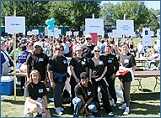Suzanne Marks Worked with Village Women, Turning Small Businesses into Success Stories for Entire Families

Suzanne Marks is an epidemiologist in the Clinical and Health Systems Research Branch in the Division of Tuberculosis Elimination of the NCHHSTP. She’s been at CDC since 1997. She served in the Peace Corps from 1983 to 1985 in Togo, West Africa. "I entered the Peace Corps after completing my coursework for a master´s degree in Economics, with a specialty in economic development theory. I first decided to join the Peace Corps during a political science internship in Washington, DC, after hearing former Peace Corps Director Dick Celeste tell volunteers´ stories of overcoming incredible challenges. Peace Corps fit in with my studies and personal goals; I wanted real world experience in international development and wanted to help others."
Marks was a rural development volunteer who worked with over 400 village women grouped into 22 weaving, dry-season gardening, and soap-making small businesses. "I helped them become self-sufficient in their organizations, develop bookkeeping systems, and solve problems that arose. The bookkeeping systems qualified the groups to obtain accounts at the credit union from which they could obtain loans and make investments in lucrative projects. The business groups also became social groups that helped individual members in financial need or those in poor health."
Working daily with women who got up at the crack of dawn, fed and cared for their families, worked all day cultivating the fields or selling goods at the marketplace, often with one child attached to their back and others in tow, she saw the inextricable link between health and economic well-being. "Health problems of women immediately created problems for their whole family. On the other hand, economic successes of the women immediately translated into benefits for the entire family. I was very cognizant of that [nutritional] aspect of health, but, I also became aware of the critical nature of reproductive health for women living in a culture in which they had little to no control over their fertility. I personally knew one young woman who died after a back-alley abortion attempt and another who nearly died. When I returned to the US, I finished up my master´s degree in economics while working at USDA and then took a job in family planning, where I become increasingly involved in efforts to address HIV. Not long afterwards, I decided to continue studies in public health at Johns Hopkins. Eventually, I landed here at CDC."
Tolerance and being open-minded to different ways of doing things are essential to working effectively in different cultures, Marks adds. "Nearly every Peace Corps Volunteer develops and exhibits the ‘can do’ attitude," Marks says. "Although working together at CDC in the South is sometimes a challenge, since I identify as a member of a minority culture (LGBT persons--lesbian, gay, bisexual, transgender) that is often the object of discrimination and homophobia. I could also add that being a woman and a non-physician also presents some challenges at CDC."
She highly recommends Peace Corps Service to any adult, she says. "There is no upper age limit. It vastly expands your experiences and network of friends, who eventually become like family." Marks speak French and some Spanish.
- Page last reviewed: January 7, 2015
- Page last updated: January 7, 2015
- Content source:
Global Health
Notice: Linking to a non-federal site does not constitute an endorsement by HHS, CDC or any of its employees of the sponsors or the information and products presented on the site.


 ShareCompartir
ShareCompartir